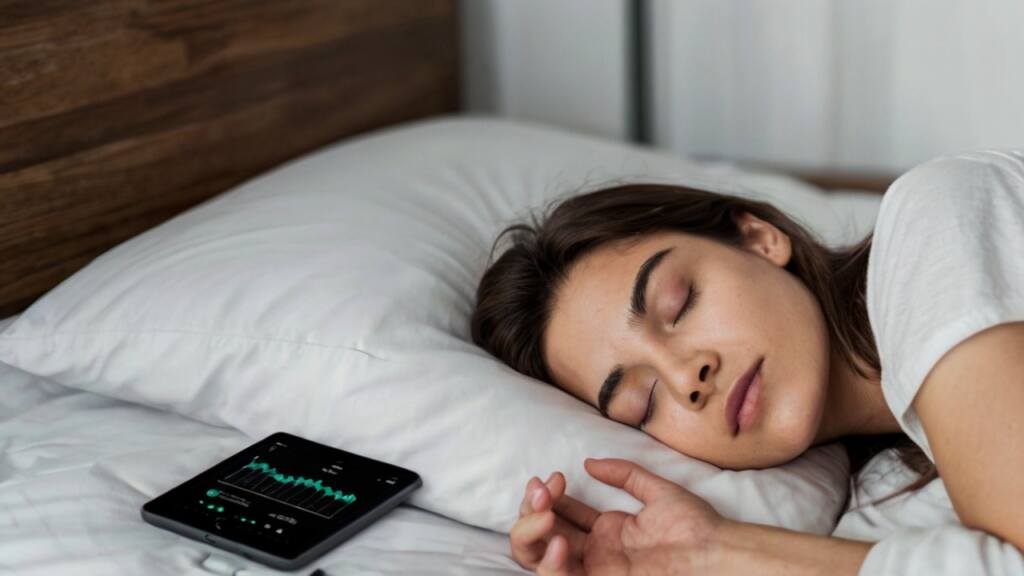Sleep Tracking Devices & Apps

In today’s fast-paced world, quality sleep is crucial for maintaining overall health and well-being. Sleep tracking devices and apps offer innovative solutions to monitor and improve sleep patterns. This article explores the features, benefits, and implications of these technologies, providing valuable insights for those looking to enhance their sleep quality.
Understanding Sleep Tracking Devices
Sleep tracking devices have revolutionized how we understand and optimize our sleep. These devices, ranging from wearable technology to non-wearable options, provide detailed insights into various aspects of sleep.
Wearable Technology: Devices like smartwatches and fitness bands monitor sleep patterns by tracking movements, heart rate, and even blood oxygen levels.
Non-Wearable Devices: These include under-mattress sensors and bedside monitors that offer a non-intrusive way to track sleep without wearing a device.
These tools are equipped with advanced sensors that gather data to provide a comprehensive sleep analysis.
Key Features of Sleep Tracking Devices
Transitioning from the general overview, it’s essential to understand the specific features that make these devices effective.
Heart Rate Monitor: Most sleep trackers come with heart rate monitoring, offering insights into heart rate variability and overall cardiovascular health during sleep.
Sleep Apnea Detection: Advanced models can detect irregular breathing patterns, providing crucial information for diagnosing sleep apnea.
REM Sleep Monitoring: By analyzing the different stages of sleep, including REM and deep sleep, these devices help users understand their sleep cycles better.
These features, combined with user-friendly interfaces, make sleep-tracking devices an essential tool for sleep optimization.
How Sleep Trackers Work
Sleep trackers function by using various sensors to gather data while you sleep. Understanding the mechanics can help you choose the right device for your needs.
Motion Sensors: Track movements to determine sleep stages.
Optical Sensors: Measure heart rate and blood oxygen levels.
Microphones: Some devices use sound analysis to detect snoring or irregular breathing.
By breaking down these components, users can appreciate the technology behind these devices and their accuracy.
Optimizing Sleep with Data
With the data collected by sleep trackers, users can take actionable steps to improve their sleep quality.
Analyzing Sleep Patterns: Detailed reports highlight trends and irregularities in sleep habits.
Personalized Tips: Many apps provide tailored advice based on the tracked data, such as optimal sleep times and environment adjustments.
Setting Goals: Users can set sleep goals and track their progress over time.
Practical tips and step-by-step guidance help users implement changes for better sleep.
Benefits of Using Sleep Trackers
Sleep tracking devices offer numerous advantages that go beyond simply monitoring sleep.
Sleep Quality Improvement: By identifying disruptions and suggesting improvements, these devices help enhance sleep quality.
Health Insights: Continuous heart rate monitoring and sleep apnea detection provide valuable health data.
Increased Awareness: Users become more aware of their sleep patterns and the factors affecting their sleep.
Addressing potential counterarguments, such as privacy concerns, can provide a balanced view of the technology’s benefits.
Choosing the Right Sleep Tracker
Selecting the right sleep tracker involves considering various factors and available options.
Device Compatibility: Ensure the tracker is compatible with your smartphone or other devices.
Feature Set: Choose a device with the features that best meet your needs, such as heart rate monitoring or sleep apnea detection.
User Reviews: Research user feedback to gauge the device’s reliability and accuracy.
Offering additional resources, like expert reviews and comparison charts, can help readers make informed decisions.
The Future of Sleep Tracking Technology
Looking ahead, sleep-tracking technology is set to become even more advanced and integrated into our daily lives.
Trends: Emerging trends include the use of artificial intelligence and machine learning to provide even more accurate and personalized insights.
Developments: Future developments may include seamless integration with other health monitoring systems and more non-intrusive tracking methods.
Encouraging readers to stay informed and consider incorporating these advancements into their routines can foster proactive health management.
Conclusion
Sleep tracking devices and apps offer powerful tools for understanding and improving sleep quality. By leveraging advanced technology, users can gain valuable insights into their sleep patterns and take actionable steps toward better health. Explore the latest sleep-tracking options and start your journey to better sleep today. For further exploration, consider consulting health professionals or diving into the latest research on sleep optimization.
https://7thavewellnessblog.com/?p=571
https://www.apple.com/
FAQs
Q: What are sleep-tracking devices and apps?
A: Sleep-tracking devices and apps are tools that help you monitor and manage your sleep patterns. They often use features like smart alarms, pillow sensors, or sleep-tracking apps to track your sleep cycles and provide insights on how to improve your sleep quality.
Q: How do sleep-tracking devices work?
A: Sleep tracking devices typically use sensors to monitor your movements and sleep patterns throughout the night. They collect data on factors like light sleep, deep sleep, REM sleep, and even sleep talking. This data is then analyzed to provide you with detailed sleep reports and recommendations.
Q: What is a smart alarm in relation to sleep tracking?
A: A smart alarm is a feature commonly found in sleep tracking devices and apps. It uses information about your sleep phase to wake you up at the optimal time within a specified window, helping you feel more refreshed and alert in the morning.
Q: How can a sleep-tracking app help me sleep better?
A: A sleep-tracking app can help you sleep better by providing insights into your sleep patterns and suggesting ways to improve your sleep hygiene. Some apps also offer features like sleep sounds, guided meditation, or bedtime routines to help you relax and fall asleep faster.
Q: What are some of the best sleep-tracking devices and apps available?
A: Some popular sleep-tracking apps include Sleep Cycle, Sleep as Android, and apps offered on the App Store or Google Play. These apps offer a range of features like sleep notes, sleep data graphs, and personalized sleep scores to help you monitor your sleep health.







